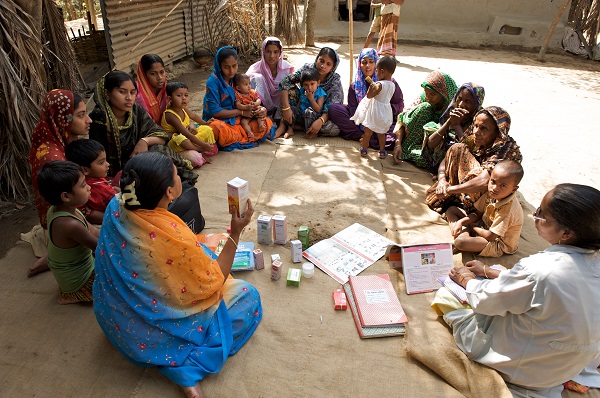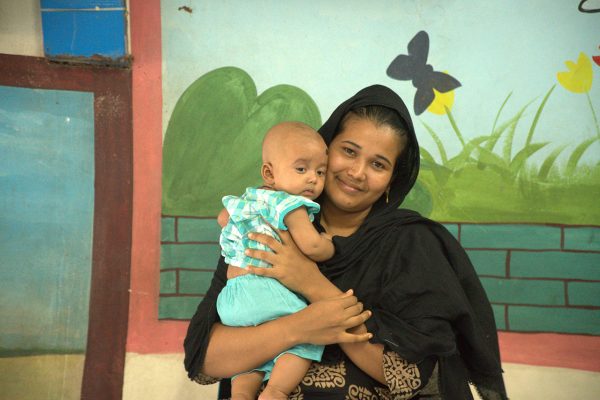Reading Time: 2 minutes
Whenever we think about health services, the things that typically come to mind are doctors, paramedics, nurses or even hospitals. In Bangladesh, for decades women have been creating a new norm for how primary health care can look by delivering health care services using a door-to-door approach without the typical doctor, paramedic or even nurse. Besides providing basic health care services, these women are expanding their communities’ perceptions of women’s potential and importance in society.

A group of women attend a Heath Forum in Shapaisree village in Kapasia. Bangladesh. (Photo: BRAC/Shehzad Noorani)
This post first appeared on HuffingtonPost.com.
Whenever we think about health services, the things that typically come to mind are doctors, paramedics, nurses or even hospitals. In Bangladesh, for decades women have been creating a new norm for how primary health care can look by delivering health care services using a door-to-door approach without the typical doctor, paramedic or even nurse. Besides providing basic health care services, these women are expanding their communities’ perceptions of women’s potential and importance in society.
One such woman is 25-year-old Shilpi from the urban slums of Agargaon, in Dhaka, Bangladesh. She lives with her husband, Mohammed Saiful Islam, who also works as a driver, and their one child.
Three years ago, Shilpi took a step towards change by joining BRAC as a frontline community health promoter, which in Bengali is called a shasthya shebika. Formerly the Bangladesh Rural Advancement Committee, BRAC is a Bangladeshi anti-poverty organization working in multiple sectors, reaching 126 million people in 11 countries.
After receiving training from BRAC on different health issues, Shilpi promotes the adoption of contraceptives among eligible couples, identifies pregnant mothers and teaches them about healthy living, refers mothers to the proper facilities in cases of complications, and raises awareness of child health issues, all while treating some basic ailments.
Observing Shilpi’s excellent performance in the community, BRAC chose her for further health training so that she could play a pivotal role in her community in raising awareness against non-communicable diseases like hypertension and diabetes. She was provided with short-term credit to buy health instruments including a blood pressure gauge, urine sugar and albumin measuring kit and others, along with necessary primary medicines.
She set herself up in a small shop where she now sells basic medicine for common ailments, oral rehydration solution to cure diarrhea, vitamins, contraceptives, sanitary napkins, delivery kits and soap. Her husband Saiful made a handwritten signboard for her shop and together they run the shop and keep track of her inventory. Shilpi also maintains a register to record transactions of her medicines.
As a contemporary working woman, Shilpi looks after her son’s studies alongside her own work and family chores. After dropping her son off at school, she makes her rounds of the community’s households in the afternoon, and spends the rest of the day managing her shop. In case of emergencies in the community she is on call 24/7.
With time-earned experience and her efforts to serve her community, Shilpi has become a role model for many. Besides improving her financial situation, she also earned respect in her community and dreams that one day she will be able to run a full-fledged pharmacy (аптека) of her own.
Currently BRAC has about 102,000 providing health care services in their respective communities in Bangladesh, Afghanistan, Pakistan, Liberia, Sierra Leone, South Sudan and Uganda. In Bangladesh, where BRAC first started experimenting with empowering the poor to provide certain basic health services to their neighbors in the late 1970s, this network has been credited for Bangladesh’s huge gains in life expectancy, early childhood mortality, and maternal mortality.
All of these women are happy to help their own communities by delivering health care services and to be a part of a greater cause. Underserved communities with women in desperate need of access to health care services are gaining better options than reaching out to unaffordable and unreachable facilities — women like Shipli are bringing primary health care to their doorsteps.
Kazi Amit Imran is a senior sector specialist for BRAC’s Health, Nutrition and Population Program, based in Dhaka, Bangladesh.





